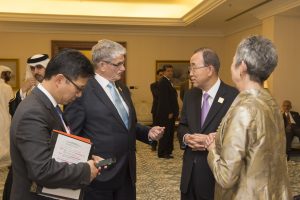Remarks by H.E. Mr Mogens Lykketoft, President of the 70th session of the General Assembly, at the First Plenary Session of the 16th Doha Forum.
22 May 2016

©UN Photo
Honourable Ministers, Excellencies, Mr Moderator, distinguished guests, ladies and gentlemen,
It is a great honour to address the first plenary of the Doha Forum on the theme of regional and global peace and security.
Being here in the Middle East, this theme takes on a great sense of urgency for the challenges facing this region are truly immense:
- A protracted conflict in Syria and a fragile truce in Yemen;
- Terrorist groups like the Islamic State bringing death and havoc to Iraq, Syria, Libya and elsewhere;
- the Israeli/Palestinian conflict that remains without peaceful solution;
- the immense strains on stability in Jordan and Lebanon as well as in Turkey in the face of an incredible refugee and humanitarian crisis;
- the escalation of tensions between regional powers and destructive sectarian divisions, that exacerbate further violent extremism;
- the destabilising effect of climate change, droughts and land degradation,
- and too many instances of where neither power nor prosperity are shared in a way that brings societies together.
Many of these challenges, however, are not unique to the Middle East as was highlighted at a High Level Thematic Debate of the General Assembly that I convened in New York only two weeks ago.
At that meeting, member states were clear that to address challenges in the area of peace and security, we must of course start at home.
There is no substitute for political leadership and those countries and those groups most involved in current conflicts particularly in Syria must do more to bring an end to the suffering, the divisions and the tensions that are depriving millions of a better future.
Member states were also clear however, that the international community and the UN especially, can also do more.
As the UN marks its 70th anniversary, member states are coming to terms with the fact that the architecture developed these past 7 decades to maintain international peace and security is struggling to keep pace with today’s and tomorrow’s threats and geopolitical tensions.
In particular, the absence of adequate tools and capacity to protect civilians in conflict; to respond effectively to new forms of complex conflicts; to address international terrorism, as well as other challenges with a clear security dimension such as large-scale epidemics and large displacement of populations, has undermined trust in the UN’s ability to fully deliver on its mandate.
In this context, it is crucial that member states recommit to the principles and purposes of the Charter of the United Nations, refrain from the use of force or the threat of the use of force and uphold their obligations under international humanitarian law.
Last year UN member states joined hands in adopting the SDGs and the Paris climate agreement and in the security sphere, we saw renewed cooperation between major powers on Iran and even on Syria.
When multilateralism works it can provide solutions and hope for the future.
Now, we must build on that spirit going forward.
In particular, we must take that concrete action to address the UN’s shortcomings.
A number of major UN reviews are currently looking at how the UN and the international community as a whole is performing in conducting peace operations; in supporting peacebuilding efforts; in enhancing the role of women in matters of peace and security; in preventing violent extremism and in countering global terrorism.
Recommendations that have emerged thus far are clear: To respond to today’s and tomorrow’s threats to peace and security, the United Nations must become more relevant, more credible, more legitimate and more capable. For major, regional and local powers alike.
For many, this includes making the UN Security Council more effective and more representative, and I share this view.
But it also includes the need:
- For political solutions to inform every aspect of the UN’s approach to sustaining peace.
- To put prevention at the heart of the UN’s peace and security architecture, and forging a consensus on a crucial set of budgetary and institutional reforms to that effect.
- To ensure that the UN works more seamlessly across its three pillars of peace and security, sustainable development and human rights and that it engages more consistently with affected communities.
- To ensure that women are more involved in both preventing and resolving conflicts and promote the role of women both in policy and in leadership positions.
- To identify concrete ways in which the UN could effectively contribute to the international coordination, prevention and response to terrorism and violent extremism, including in the context of the UN mandated missions and operations.
- To bring about greater cooperation between the United Nations and regional organizations and provide opportunities for greater involvement to those member states who wish to play greater roles in global peace and security.
- And to ensure that the UN special representatives who lead peace efforts are of the highest integrity and diplomatic skill.
Many of these changes require both institutional and structural changes at the United Nations and it is clear that the next UN Secretary-General, due to be appointed later this year, will have a unique window of opportunity early in his or her term to put those changes in place.
To do so however, he or she will need significant and sustained support from member states and it is my hope that discussions at Forums like this can help advance this discussion and secure broad buy-in for such changes.
Because, ladies and gentlemen, in the end, our collective security depends not just on our own individual actions but on the capacity of the United Nations, as the UN Charter states, ‘to unite our strength to maintain international peace and security (…and) to live together in peace with one another as good neighbours’.
Thank you.

